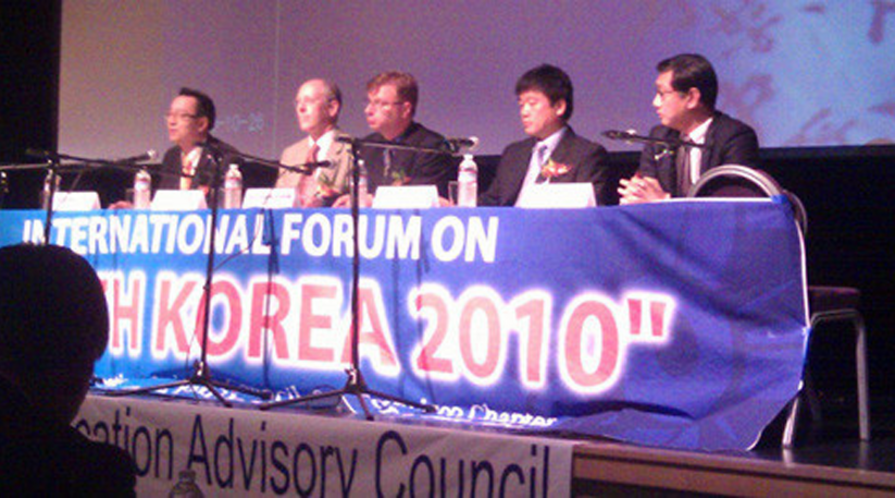Shorenstein APARC experts take part in "North Korea 2010" forum

An international forum on North Korea was held in Palo Alto on October 26, 2010, in an effort to educate the public on reunifying the two Koreas. The San Francisco Chapter of the National Unification Advisory Council organized the forum. Approximately 150 audience members heard panelists speak about the economic, social, and political challenges that face South Korea today in its preparation for a peaceful reunification, as well as about their visions for the future of North Korea.
Gi-Wook Shin, the director of the Walter H. Shorenstein Asia-Pacific Research Center (APARC), moderated the presentations and the panel discussion. The panel of four experts included John Everard, 2010-2011 Pantech Fellow at APARC and a former British ambassador to North Korea, speaking about diplomacy and security; Greg Scarlatoiu, director of public affairs and business issues at the Korea Economic Institute, on economic issues; Sang-Hun Choe, 2010-2011 Fellow in Korean Studies at APARC and a reporter at the International Herald Tribune, on factionalism; and Jung Kwan Lee, the South Korean Consul General in San Francisco, on South Korea's policy toward North Korea.
Everad analyzed North Korea's development during the Cold War of a diplomatic technique by which it repeatedly attempted to play one ally off against another in its relationships with the Soviet Union and China. While arguing that North Korea continues to make effective use of this technique against South Korea, the United States, and the European Union, Everad noted that North Korea's current political uncertainty, following the succession, and its ongoing economic concerns will together create a situation in which it may be very difficult for North Korea to maintain political solidarity.
Scarlatoiu, meanwhile, contended that North Korea's is a post-Stalinist, neo-patrimonial economy. Thus, with recent efforts such as the 2002 market reforms and the 2009 currency reform, the North Korean regime has found itself confronted with a major dilemma. According to Scarlatoiu, while economic reforms are necessary to the long-term survival of the regime, they could also lead to the regime's collapse. This predicament, he added, must be considered as the regime undergoes a leadership transition in the succession to Kim Jong-un.
Choe spoke on the process of succession to Kim Jong-un as well, pointing out that while Kim Jong-un is indisputably the heir to the leadership of North Korea, he has yet to prove his competency as North Korea's future leader. In addition, Choe emphasized that difficulties judging North Korea's intentions and anticipating its behavior stem from the outside world's inability to understand the North Korean leadership and the goals that it truly has in mind.
Finally, Lee stressed that the basic objectives of South Korea's policy on North Korea are to promote a common prosperity and to peacefully resolve North Korean nuclear issues. However, he also made it clear that the South Korean government is seeking to keep North Korean nuclear issues distinct from the issue of inter-Korean relations.
